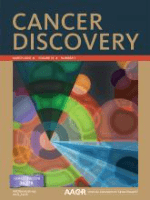
Cancer Discovery
Scope & Guideline
Advancing the Frontiers of Oncology Research
Introduction
Aims and Scopes
- Hematological Malignancies Research:
The journal publishes significant findings related to various blood cancers, such as leukemia, lymphoma, and myeloma, focusing on their underlying biology, treatment strategies, and clinical outcomes. - Innovative Therapeutic Approaches:
A strong emphasis is placed on novel therapeutic modalities, including CAR T-cell therapy, bispecific antibodies, and immune checkpoint inhibitors, exploring their mechanisms, efficacy, and associated toxicities. - Molecular and Genetic Insights:
Research on the molecular and genetic underpinnings of cancer, including mutations, epigenetic changes, and clonal evolution, informs the understanding of disease progression and therapeutic resistance. - Translational Research:
The journal aims to translate laboratory discoveries into clinical practice, facilitating the development of personalized medicine strategies and improving patient outcomes. - Collaboration and Network Building:
It fosters collaboration among researchers, clinicians, and institutions to enhance the impact of cancer research and improve treatment paradigms.
Trending and Emerging
- CAR T-cell Therapy Innovations:
Research related to CAR T-cell therapy is expanding, highlighting novel approaches to enhance efficacy and reduce resistance, as well as addressing complications such as neurotoxicity and immune escape. - Precision Medicine and Genomic Profiling:
There is an increasing emphasis on precision medicine, with studies focusing on genomic profiling to identify therapeutic vulnerabilities and inform personalized treatment strategies for patients. - Immune Microenvironment Interactions:
The role of the immune microenvironment in cancer progression and therapy response is a growing area of interest, investigating how immune cells and tumor interactions influence disease outcomes. - Clonal Hematopoiesis and Disease Progression:
Research on clonal hematopoiesis and its implications for cancer risk and treatment responses is on the rise, indicating a deeper understanding of its role in hematologic malignancies. - Integration of Single-Cell Technologies:
The application of single-cell sequencing and analysis techniques is emerging as a key methodology, providing insights into tumor heterogeneity and immune responses at an unprecedented resolution.
Declining or Waning
- Traditional Chemotherapy Studies:
With the rise of targeted therapies and immunotherapies, traditional studies focused solely on chemotherapy regimens are being published less frequently, indicating a shift towards more innovative treatment strategies. - General Cancer Biology:
Broad studies on cancer biology without a specific focus on hematological malignancies are becoming less common, as researchers increasingly concentrate on more specialized and relevant topics. - In vitro Models of Cancer:
There is a noticeable decrease in publications utilizing traditional in vitro models, as researchers are moving towards more sophisticated models, such as patient-derived xenografts and organoids, which provide better insights into human disease.
Similar Journals

Cancer Research Communications
Empowering global collaboration in cancer research.Cancer Research Communications is an esteemed journal published by the American Association for Cancer Research, a leading organization in the field of oncology. This journal aims to advance knowledge in cancer research through the dissemination of high-quality, peer-reviewed articles that cover a wide range of topics related to cancer biology, treatment modalities, and prevention strategies. As an open-access journal, Cancer Research Communications ensures that vital research findings are accessible to a global audience, promoting collaboration and innovation within the scientific community. The journal serves as a crucial platform for researchers, professionals, and students to share their insights and foster the exchange of effective cancer therapies and methodologies. With a commitment to excellence, it plays a significant role in shaping the future of cancer research and therapeutic development.

Oncologie
Pioneering insights in the fight against cancer.Oncologie is a distinguished academic journal published by WALTER DE GRUYTER GMBH, focusing on the dynamic and vital field of oncology. Established in 1999 and continuously published until 2024, this journal provides a platform for high-quality research and advancements in cancer treatment, prevention, and diagnosis. With an ISSN of 1292-3818 and an E-ISSN of 1765-2839, it is indexed in various databases, contributing to its growing visibility. Although categorized in the Q3 quartile for oncology research as of 2023, Oncologie offers essential insights and fosters scholarly dialogue among researchers, professionals, and students interested in oncology. Its unique contributions aim to bridge the gap between theoretical frameworks and clinical applications, making it a valuable resource for those seeking to advance their knowledge and expertise in cancer research.
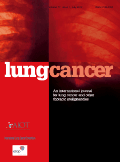
LUNG CANCER
Innovating Solutions for Lung Cancer ChallengesLUNG CANCER, published by Elsevier Ireland Ltd, is a pivotal academic journal dedicated to advancing knowledge in the fields of Cancer Research, Oncology, and Pulmonary and Respiratory Medicine. With an impressive impact factor reflected by its Q1 ranking across three key categories for 2023, this journal occupies a prestigious position within the research community, emphasizing quality and significance in published works. Since its inception in 1985, LUNG CANCER has provided a comprehensive platform for researchers and clinicians to disseminate findings and novel insights, enhancing the understanding and treatment of lung cancer. The journal stands out with Scopus rankings, placing it in the top percentile across multiple relevant fields, including a notable rank of #20 in Pulmonary and Respiratory Medicine. By fostering collaboration among scholars, the journal aims to facilitate innovative research and promote evidence-based practices that could transform patient outcomes. As such, LUNG CANCER is an essential resource for those navigating this complex area of study, from seasoned researchers to aspiring professionals.
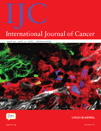
INTERNATIONAL JOURNAL OF CANCER
Transforming knowledge into breakthroughs in cancer care.INTERNATIONAL JOURNAL OF CANCER, published by Wiley, stands as a premier platform for the dissemination of cutting-edge research in the fields of cancer research and oncology. With an impressive impact factor reflecting its rigorous peer-review process and significant contribution to the scientific community, this journal is categorized in Q1 for both Cancer Research and Oncology as of 2023. It boasts notable rankings, being placed 38th among 404 journals in Medicine - Oncology and 32nd among 230 in Biochemistry, Genetics, and Molecular Biology - Cancer Research, positioning it within the 90th and 86th percentiles, respectively. Since its inception in 1966 and continuing to 2024, the journal has played a pivotal role in advancing our understanding of cancer biology, treatment modalities, and innovative therapeutic approaches. While it operates under a subscription model, the journal is committed to making valuable research accessible to a broader scientific audience. Researchers, professionals, and students alike will find the INTERNATIONAL JOURNAL OF CANCER an essential resource for staying abreast of the latest advancements in cancer science.
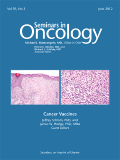
SEMINARS IN ONCOLOGY
Connecting Researchers and Practitioners in OncologySEMINARS IN ONCOLOGY is a premier journal in the field of oncology, published by W B Saunders Co-Elsevier Inc. With its ISSN 0093-7754 and E-ISSN 1532-8708, this esteemed publication has been contributing significantly to cancer research and education since its inception in 1974. The journal currently holds a distinguished position in the academic landscape, ranking in the Q1 category for Hematology and Q2 for Oncology, and featured prominently in Scopus rankings—34th out of 137 in Medicine Hematology, and 108th out of 404 in Medicine Oncology. SEMINARS IN ONCOLOGY aims to disseminate cutting-edge research, critical reviews, and innovative treatment approaches, making it an invaluable resource for researchers, healthcare professionals, and students dedicated to the fight against cancer. Although not an Open Access journal, it maintains a commitment to high-quality, peer-reviewed content, further solidifying its role as a vital reference point in oncological studies. The journal serves as a crucial platform for the exchange of knowledge, insights, and advancements that shape the future of cancer care.
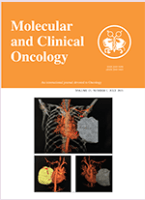
Molecular and Clinical Oncology
Connecting researchers to revolutionize cancer treatment.Molecular and Clinical Oncology is a dynamic journal published by SPANDIDOS PUBL LTD, aimed at advancing the understanding of cancer biology and treatment modalities. With an ISSN of 2049-9450 and an E-ISSN of 2049-9469, the journal serves as a critical platform for researchers and clinicians dedicated to uncovering novel insights in molecular oncology and enhancing clinical practices. As a testament to its growing influence, the journal has achieved a Q3 ranking in Oncology and a Q4 ranking in Cancer Research for the year 2023, reflecting its commitment to publishing high-quality research. Although currently not an Open Access publication, the journal offers crucial subscription options, ensuring comprehensive access to groundbreaking studies and innovations in the field. With converged years spanning 2018 to 2024, the journal is set to continue enriching the academic community with its valuable contributions, ultimately empowering researchers, professionals, and students engaged in the fight against cancer.
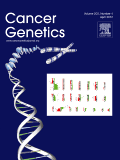
Cancer Genetics
Advancing Cancer Research Through Genetic InsightsCancer Genetics is an esteemed peer-reviewed journal dedicated to advancing the field of cancer research through the lens of genetics. Published by Elsevier Science Inc and available in both print (ISSN: 2210-7762) and online (E-ISSN: 2210-7770), this journal aims to provide a platform for the dissemination of high-quality studies that unravel the genetic underpinnings of cancer. Since its inception in 2011, Cancer Genetics has become a significant resource for researchers, professionals, and students with a shared interest in understanding the intricate relationship between genetics and oncogenesis. With an impact factor that reflects its influence, the journal has maintained a Q3 ranking in Cancer Research, Genetics, and Molecular Biology as of 2023, indicating its growing importance in these fields. Additionally, the journal offers open access options to ensure that crucial findings are easily accessible to the global research community. By bridging the gap between genetics and cancer studies, Cancer Genetics plays a pivotal role in fostering innovation and collaboration among scientists and clinicians striving to improve cancer diagnosis and treatment.
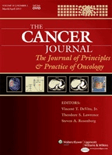
CANCER JOURNAL
Fostering Collaboration in the Fight Against Cancer.CANCER JOURNAL is a leading peer-reviewed publication dedicated to the dissemination of innovative research in the fields of cancer research and oncology. Published by Lippincott Williams & Wilkins, this journal serves as an essential resource for researchers, clinicians, and students seeking to advance their understanding of cancer mechanisms, treatment strategies, and patient care. With an ISSN of 1528-9117 and an E-ISSN of 1540-336X, it boasts a respectable 2023 Q2 category ranking in both Cancer Research and Oncology, reflecting its impactful contributions to the scientific community. Although it currently does not offer open access, the journal's rigorous peer-review process ensures the publication of high-quality, relevant studies that stimulate further investigation and collaboration among professionals. Since its inception, the journal has evolved through several converged years, maintaining a steadfast commitment to addressing the complexities of cancer biology and treatment. At its core, CANCER JOURNAL aims to foster advancements in oncology, making it a vital platform for sharing pivotal findings that could transform cancer research and therapeutic practices.

Blood and Lymphatic Cancer-Targets and Therapy
Uncovering Innovative Therapies for Cancer CareBlood and Lymphatic Cancer-Targets and Therapy, published by DOVE MEDICAL PRESS LTD, is a vital open-access journal that has been disseminating crucial research and findings in the field of hematology and oncology since 2011. With its ISSN 1179-9889, this journal focuses on the latest therapeutic targets and innovative treatment strategies for blood and lymphatic cancers, contributing significantly to the advancement of knowledge and practice in this specialized area. Designed for researchers, healthcare professionals, and students alike, Blood and Lymphatic Cancer-Targets and Therapy aims to foster a deeper understanding of cancer biology and promote collaborative efforts leading to novel therapeutic interventions. The open-access model ensures that research findings are readily accessible to a global audience, underscoring the journal's commitment to enhancing patient care and fostering educational growth in the cancer domain.

HemaSphere
Delivering cutting-edge insights to the hematology community.HemaSphere, published by WILEY, stands at the forefront of hematology research, offering a vital platform for the dissemination of cutting-edge findings in the field. Since its inception in 2017 and official transition to Open Access in 2018, the journal has positioned itself as a leading conduit for high-impact research, maintaining a prestigious Q1 quartile ranking in the Hematology category as of 2023. Addressed in the United States at 111 River St, Hoboken, NJ, HemaSphere aims to foster a global dialogue among researchers, clinicians, and students by providing unrestricted access to high-quality content that encompasses clinical and experimental advancements. With an array of engaging articles, reviews, and commentaries, HemaSphere contributes significantly to the advancement of hematology, ensuring that critical knowledge is readily accessible to enhance patient care and innovative research. To explore the latest developments and breakthroughs in this dynamic field, we invite scholars, professionals, and students to engage with HemaSphere and elevate their understanding of hematologic science.